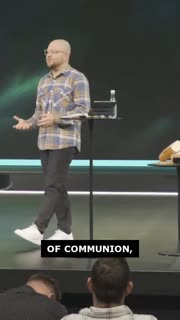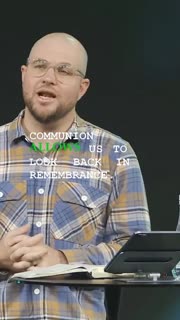Understanding the Depth of Communion: A Sacred Reminder
Devotional
Sermon Summary
Bible Study Guide
Sermon Clips
1. "If you're not careful, if I'm not careful as a believer of Jesus, we can go through the motions of our faith. And as I said in our Y series, we know the what, but we often miss the importance and the why." [44:52] (12 seconds)
2. "Communion is not just this little emblem that is in your seat pocket right now, or if you're up at snows or online, whatever you grab out of your fridge in a moment. But this, it's far more than a partaking of just some ritual. But as we're going to understand, it is the very lifeblood of the Savior we follow." [48:27] (23 seconds)
3. "We can read a passage like this and we can say this is cool and we can partake in the emblems. We can say we're followers of Jesus and once a month come around communion, but fail to realize that this is far more than an emblem. But the father of heaven sent his one and only son and Jesus risked it all and cost his life for your and my salvation and relationship." [49:52] (30 seconds)
4. "When we partake of communion, it's an opportunity for you and me to renew our trust in Jesus and reflect on the promises he's already given. It's both a reminder that it's not just something we do physically, but as we partake of this physically, I would say it is a reminder that it's something Jesus has done for us." [55:31] (28 seconds)
5. "Jesus himself promises to forgive our sins. As we read in Luke 22 verse 20, after he took supper, he took another cup of wine. He says, this cup is the new covenant between God and his people, an agreement confirmed with my blood, which is poured out as a sacrifice for you. We can't earn it, but Jesus freely gave it." [57:21] (29 seconds)
6. "Communion allows us to look back in remembrance. We take communion, as Jesus put it, to remember him. As we read in verse 19 of Luke 22, take this what in remembrance of me. It's my body that was broken for you. More specifically, Jesus is trying to make the point that I'm about to be crucified, guys, and I want you to understand that I'm not really a baby anymore." [59:24] (33 seconds)
7. "Communion is an opportunity for you and I to look inward with repentance. So not just looking back in remembrance, but now we have an opportunity to look inward with repentance. What do I mean by that? I believe communion has the opportunity for you and I to remind us that Jesus's death was actually necessary for sin to be overcome. And not just for sin, but for your sin, my sin." [01:01:14] (34 seconds)
8. "Communion gives us a chance not just to look back, not just to look inward, but to now look around at relationship. Eating the bread, the wafer, drinking the wine, the juice, it can feel intimate and a private moment between you and God. And to some extent, that's actually what it should do. However, communion is not just that. It's actually far more than that." [01:05:10] (29 seconds)
9. "Communion gives us a chance not just to look back, not just to look inward, but to now look around at relationship. Eating the bread, the wafer, drinking the wine, the juice, it can feel intimate and a private moment between you and God. And to some extent, that's actually what it should do. However, communion is not just that. It's actually far more than that." [01:05:10] (29 seconds)
10. "Communion is an opportunity for you and I to look inward with repentance. So not just looking back in remembrance, but now we have an opportunity to look inward with repentance. What do I mean by that? I believe communion has the opportunity for you and I to remind us that Jesus's death was actually necessary for sin to be overcome. And not just for sin, but for your sin, my sin." [01:01:14] (34 seconds)
Ask a question about this sermon
2. "Communion is not just this little emblem that is in your seat pocket right now, or if you're up at snows or online, whatever you grab out of your fridge in a moment. But this, it's far more than a partaking of just some ritual. But as we're going to understand, it is the very lifeblood of the Savior we follow." [48:27] (23 seconds)
3. "We can read a passage like this and we can say this is cool and we can partake in the emblems. We can say we're followers of Jesus and once a month come around communion, but fail to realize that this is far more than an emblem. But the father of heaven sent his one and only son and Jesus risked it all and cost his life for your and my salvation and relationship." [49:52] (30 seconds)
4. "When we partake of communion, it's an opportunity for you and me to renew our trust in Jesus and reflect on the promises he's already given. It's both a reminder that it's not just something we do physically, but as we partake of this physically, I would say it is a reminder that it's something Jesus has done for us." [55:31] (28 seconds)
5. "Jesus himself promises to forgive our sins. As we read in Luke 22 verse 20, after he took supper, he took another cup of wine. He says, this cup is the new covenant between God and his people, an agreement confirmed with my blood, which is poured out as a sacrifice for you. We can't earn it, but Jesus freely gave it." [57:21] (29 seconds)
6. "Communion allows us to look back in remembrance. We take communion, as Jesus put it, to remember him. As we read in verse 19 of Luke 22, take this what in remembrance of me. It's my body that was broken for you. More specifically, Jesus is trying to make the point that I'm about to be crucified, guys, and I want you to understand that I'm not really a baby anymore." [59:24] (33 seconds)
7. "Communion is an opportunity for you and I to look inward with repentance. So not just looking back in remembrance, but now we have an opportunity to look inward with repentance. What do I mean by that? I believe communion has the opportunity for you and I to remind us that Jesus's death was actually necessary for sin to be overcome. And not just for sin, but for your sin, my sin." [01:01:14] (34 seconds)
8. "Communion gives us a chance not just to look back, not just to look inward, but to now look around at relationship. Eating the bread, the wafer, drinking the wine, the juice, it can feel intimate and a private moment between you and God. And to some extent, that's actually what it should do. However, communion is not just that. It's actually far more than that." [01:05:10] (29 seconds)
9. "Communion gives us a chance not just to look back, not just to look inward, but to now look around at relationship. Eating the bread, the wafer, drinking the wine, the juice, it can feel intimate and a private moment between you and God. And to some extent, that's actually what it should do. However, communion is not just that. It's actually far more than that." [01:05:10] (29 seconds)
10. "Communion is an opportunity for you and I to look inward with repentance. So not just looking back in remembrance, but now we have an opportunity to look inward with repentance. What do I mean by that? I believe communion has the opportunity for you and I to remind us that Jesus's death was actually necessary for sin to be overcome. And not just for sin, but for your sin, my sin." [01:01:14] (34 seconds)










